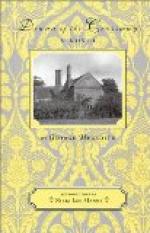Descriptions in the newspapers of the rural funeral of Lord Dannisburgh had the effect of rousing flights of tattlers with a twittering of the disused name of Warwick; our social Gods renewed their combat, and the verdict of the jury was again overhauled, to be attacked and maintained, the carpers replying to the champions that they held to their view of it: as heads of bull-dogs are expected to do when they have got a grip of one. It is a point of muscular honour with them never to relax their hold. They will tell you why:—they formed that opinion from the first. And but for the swearing of a particular witness, upon whom the plaintiff had been taught to rely, the verdict would have been different—to prove their soundness of judgement. They could speak from private positive information of certain damnatory circumstances, derived from authentic sources. Visits of a gentleman to the house of a married lady in the absence of the husband? Oh!—The British Lucretia was very properly not legally at home to the masculine world of that day. She plied her distaff in pure seclusion, meditating on her absent lord; or else a fair proportion of the masculine world, which had not yet, has not yet, ‘doubled Cape Turk,’ approved her condemnation to the sack.
There was talk in the feminine world, at Lady Wathin’s assemblies. The elevation of her husband had extended and deepened her influence on the levels where it reigned before, but without, strange as we may think it now, assisting to her own elevation, much aspired for, to the smooth and lively upper pavement of Society, above its tumbled strata. She was near that distinguished surface, not on it. Her circle was practically the same as it was previous to the coveted nominal rank enabling her to trample on those beneath it. And women like that Mrs. Warwick, a woman of no birth, no money, not even honest character, enjoyed the entry undisputed, circulated among the highest:—because people took her rattle for wit!—and because also our nobility, Lady Wathin feared, had no due regard for morality. Our aristocracy, brilliant and ancient though it was, merited rebuke. She grew severe upon aristocratic scandals, whereof were plenty among the frolicsome host just overhead, as vexatious as the drawing-room party to the lodger in the floor below, who has not received an invitation to partake of the festivities and is required to digest the noise. But if ambition is oversensitive, moral indignation is ever consolatory, for it plants us on the Judgement Seat. There indeed we may, sitting with the very Highest, forget our personal disappointments in dispensing reprobation for misconduct, however eminent the offenders.




